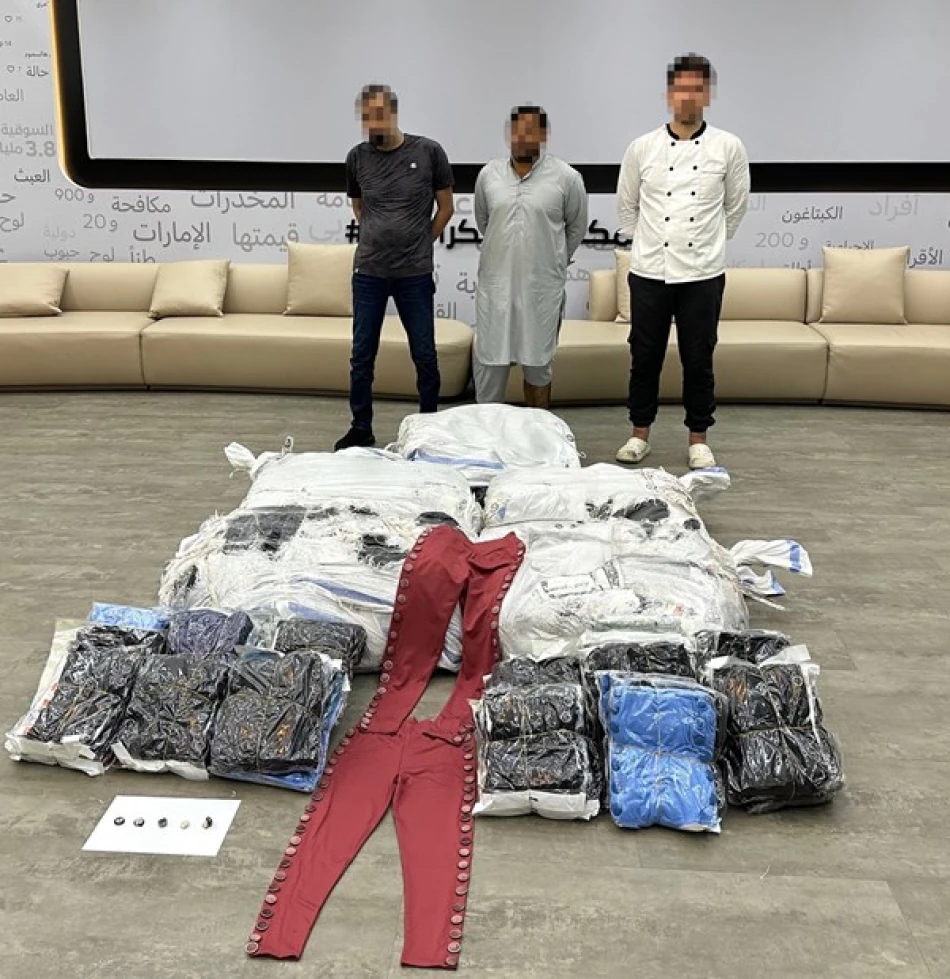
Dubai Police Bust Deadly Button Smuggling Ring
Dubai Police Bust Captagon Ring Using Clothing Buttons as Smuggling Vehicle
Dubai Police have dismantled a sophisticated drug trafficking operation that attempted to smuggle nearly 90,000 Captagon pills worth $1.2 million by concealing them inside clothing buttons. The bust, conducted in partnership with Saudi Arabia's anti-narcotics division, highlights the increasingly creative methods drug cartels are employing to evade detection across Gulf borders.
Operation "Toxic Buttons" Exposes New Trafficking Method
The three-member gang—two Arab nationals and one Asian—was arrested after attempting to smuggle 89,760 Captagon pills weighing nearly 19 kilograms. The drugs, valued at 4.48 million dirhams in street value, were meticulously hidden within clothing buttons in what authorities described as a previously unseen concealment technique.
Dubai Police launched "Operation Toxic Buttons" after receiving intelligence about the trafficking network, which operated under direction from a leader based outside the UAE. The suspects believed their button-concealment method was foolproof, treating the drug-laden garments as ordinary export merchandise.
24-Hour Surveillance Reveals Gang's Movements
Anti-narcotics officers maintained round-the-clock surveillance as the suspects repeatedly moved their stash between safe houses across Dubai and other emirates. The gang's confidence in their concealment method ultimately became their downfall—they were shocked when experienced officers immediately identified the drugs hidden within the seemingly innocent clothing accessories.
Captagon Crisis Drives Innovation in Trafficking
This operation underscores the evolving nature of Middle Eastern drug trafficking, particularly involving Captagon—an amphetamine that has become the region's most lucrative illegal trade. Unlike cocaine or heroin trafficking routes that typically flow north-south, Captagon networks operate primarily within the Arab world, making Gulf cooperation essential for interdiction efforts.
The clothing button method represents a significant evolution from traditional concealment techniques. Previous operations have uncovered drugs hidden in food products, electronics, and vehicle parts, but the miniaturization required for button concealment suggests traffickers are investing heavily in sophisticated packaging technology.
Regional Cooperation Becomes Critical
The joint UAE-Saudi operation reflects growing recognition that Captagon trafficking requires coordinated regional responses. Saudi Arabia, as the primary destination market, has intensified cooperation with transit countries like the UAE, creating a more challenging environment for trafficking organizations.
This partnership model mirrors successful anti-trafficking cooperation seen between the US and Mexico, or within the European Union, where intelligence sharing and joint operations have proven more effective than isolated national efforts.
Economic and Security Implications
For the UAE, maintaining its reputation as a secure business hub requires demonstrating strong anti-trafficking capabilities. Dubai's position as a major trade and logistics center makes it an attractive transit point for criminal organizations, but successful operations like this help preserve investor confidence in the emirate's security infrastructure.
The $1.2 million street value of this single shipment illustrates the enormous profits driving innovation in trafficking methods. As traditional routes become more difficult, criminal organizations are likely to invest even more heavily in concealment technology and corruption of legitimate trade channels.
Technology Arms Race in Drug Interdiction
Dubai Police's success in detecting the button-concealed drugs suggests significant investment in detection technology and officer training. The operation demonstrates how law enforcement agencies must continuously evolve their capabilities to match criminal innovation—a dynamic that will likely accelerate as trafficking organizations adapt to increased scrutiny.
The emphasis on international cooperation also signals recognition that modern trafficking networks operate across multiple jurisdictions simultaneously, requiring coordinated responses that transcend traditional law enforcement boundaries. This approach positions the UAE as a leader in regional security cooperation, potentially attracting additional international partnerships and intelligence-sharing agreements.
Most Viewed News

 Layla Al Mansoori
Layla Al Mansoori






